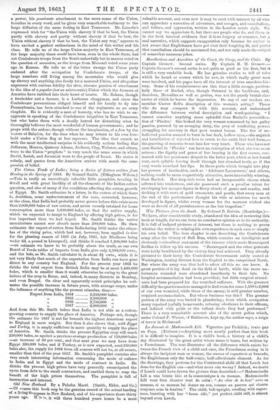Recollections and Anecdotes of the Court, the Camp, and the
Clubs. By Captain Gronow. Second series. By Captain R. II. Gronow.— Captain Gronow's second series is not quite as good as his first, but it is still a very readable book. Ho has genuine stories to toll of tales which he heard or scenes which he saw, in which really great men were involved, and his pages have all the interest of true anecdote-his- tory. Some of his reminiscences are this time a little savage, particu- larly those of Rachel, who, though Oriental to the backbone, and, therefore, Messalina as well as genius, was not the purely brutal cha- racter of which he leaves the impression. Do any of our readers re- member Currer Bell's description of this woman's acting? Those who do may compare it with this account, and understand the difference between verbal description and word-painting. "I cannot conceive anything more splendid than Rachel's personifica- tion of Phedre.' She looked the very woman consumed by her guilty passion, pursued by an avenging deity, the prey of conflicting powers struggling for mastery in that poor wasted bosom. The fire of un- hallowed passion seemed to burn in her dark, hollow eyes,—the anguish and humiliation of rejected love to crush to the earth that frail form,— the gnawing of remorse to eat into her very heart. Those who have not seen Rachel in 'Phedre ' can have no conception of what she was as an actress; the dignity and grace of her bearing in the first scenes, con- trasted with her passionate despair in the latter part, which at last found vent, each syllable forcing itself through her clenched teeth, as if the very words scorched her lips. In those parts which brought into play her powers of fascination, such as Adrienne Lecouvreur,' and others, nothing could be more coquettishly attractive, more irresistibly winning, than Rachel. Her deep rich voice had an inexpressible charm when softened into tenderness, and she possessed such a peculiar talent for enveloping her meagre figure in fleecy clouds of gauze and muslin, and decking it with rows of gold ornaments and pearls, that every man at the end of the performance thought his wife or mistress too much developed in figure, whilst every woman for the moment wished she were as devoid of all protuberances as the fair tragedian."






























 Previous page
Previous page